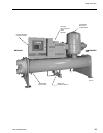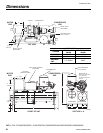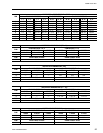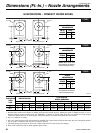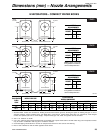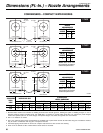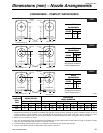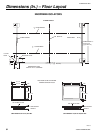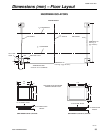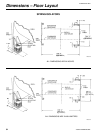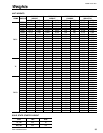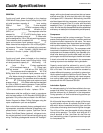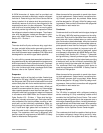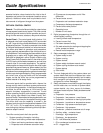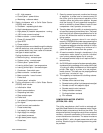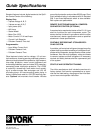
37
YORK INTERNATIONAL
FORM 160.81-EG1
A 500W immersion oil heater shall be provided and
temperature actuated to effectively remove refrigerant
from the oil. Power wiring to the Control Center shall be
factory installed. An oil eductor shall be provided to au-
tomatically remove oil which may have migrated to the
evaporator and return it to the compressor. The oil sepa-
rator shall be of a vertical design with no moving parts,
and shall provide high-efficiency oil separation before
the refrigerant enters the heat exchangers. The oil sepa-
rator shall be designed, tested and stamped in accor-
dance with ASME Boiler and Pressure Vessel Code,
Section VIII – Division 1.
Motor
The motor shall be 2-pole, continuous duty, cage induc-
tion type, and shall utilize suction gas cooling (semi-her-
metic design). Motor full-load amperes at design condi-
tions shall not exceed motor nameplate (FLA). Motor shall
be designed for use with the type starter specified.
For units utilizing remote electromechanical starters, a
large steel terminal box with gasketed front access cover
shall be provided for field connected conduit. Overload/
overcurrent transformers shall be furnished with all units.
(For units furnished with factory packaged Solid State
Starters, refer to the “Options” section.)
Evaporator
Evaporator shall be of the shell-and-tube, flooded type
designed for 235 psig (1620 kPa) working pressure on
the refrigerant side. Shell shall be fabricated from rolled
carbon steel plate with fusion welded seams or carbon
steel pipe; have carbon steel tube sheets, drilled and
reamed to accommodate the tubes; and intermediate
tube supports spaced no more than four feet apart. The
refrigerant side shall be designed, tested and stamped
in accordance with ASME Boiler and Pressure Vessel
Code, Section VIII – Division 1. Tubes shall be high-
efficiency, internally enhanced type. Each tube shall be
roller expanded into the tube sheets providing a leak-
proof seal, and be individually replaceable. Water ve-
locity through the tubes shall not exceed 12 FPS (3.6
m/s). Liquid level sight glass shall be located on the
side of the shell to aid in determining proper refrigerant
charge. The evaporator shall have a refrigerant relief
device to meet the requirements of ASHRAE 15 Safety
Code for Mechanical Refrigeration.
Water boxes shall be removable to permit tube clean-
ing and replacement. Stubout water connections hav-
ing Victaulic grooves shall be provided. Water boxes
shall be designed for 150 psig (1034 kPa) design work-
ing pressure. Vent and drain connections with plugs shall
be provided on each water box.
Condenser
Condenser shall be of the shell-and-tube type, designed
for 235 psig (1620 kPa) working pressure on the refrig-
erant side. Shell shall be fabricated from rolled carbon
steel plate with fusion welded seams or carbon steel
pipe; have carbon steel tube sheets, drilled and reamed
to accommodate the tubes; and intermediate tube sup-
ports spaced no more than four feet apart. A refrigerant
subcooler shall be provided for improved cycle effi-
ciency. The refrigerant side shall be designed, tested
and stamped in accordance with ASME Boiler and Pres-
sure Vessel Code, Section VIII – Division 1. Tubes shall
be high-efficiency, internally enhanced type. Each tube
shall be roller expanded into the tube sheets providing
a leak-proof seal, and be individually replaceable. Wa-
ter velocity through the tubes shall not exceed 12 FPS.
The condenser shall have refrigerant relief device to
meet the requirements of ASHRAE 15 Safety Code for
Mechanical Refrigeration.
Water boxes shall be removable to permit tube clean-
ing and replacement. Stubout water connections hav-
ing Victaulic grooves shall be provided. Water Boxes
shall be designed for 150 psig (1034 kPa) design work-
ing pressure. Vent and drain connections with plugs shall
be provided on each water box.
Refrigerant System
The YR chiller is equipped with a refrigerant metering
device consisting of a fully modulating variable orifice
controlled via the OptiView Control Center. This control
ensures proper refrigerant flow to the evaporator over a
wide range of operating conditions, including thermal stor-
age applications and chilled water reset. Valve operation
is programmable and can be customized for a specific
application via the OptiView Control Center keypad.
The condenser shell shall be capable of storing the en-
tire system refrigerant charge during servicing. Isola-
tion from the rest of the system shall be by manually



